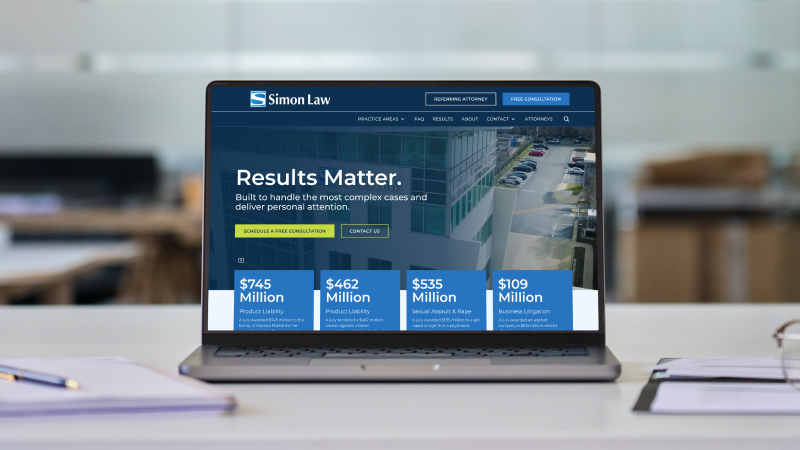SEO for Personal Injury Law Firms
We Get You More Than Rankings. We Get You Quality Cases.
When it comes to growing your practice, we understand that showing up first is only part of the equation. Our ultimate goal is to help you attract more clients. Think about it: what good is having the top search result if it doesn’t increase the number of cases you take on? That’s why we focus not only on improving your search engine rankings but also on converting those website visitors into actual cases. We’ll transform your website into a powerful client acquisition tool through compelling content, user-friendly design, and targeted calls to action.

Personal Injury Law SEO
Our Services
SEO Strategy
The first step in any personal injury SEO strategy is understanding where your law firm’s website stands today. Our team will run a thorough audit of your site and analyze competing personal injury law firms in your market. By identifying gaps and opportunities, we can develop a clear plan to help your firm stand out online and capture more qualified leads.
Keyword Research
Through in-depth keyword research, we identify the exact personal injury SEO keywords potential clients are typing into search engines. Instead of guessing, we use data-driven insights to ensure your firm shows up for the searches that matter most.
On-Page Optimization
Every detail on your law firm’s website plays a role in attracting and converting clients. From headlines and service pages to visuals and calls-to-action, we optimize your site so it speaks directly to injury victims seeking representation. Our on-page work ensures your website highlights your legal services, addresses client concerns, and positions your personal injury law firm as the clear choice.
Content Development
Trust is everything in personal injury law. That’s why we create content that demonstrates both expertise and compassion. From blog posts answering common questions (“What should I do after a car accident?”) to practice area pages showcasing your results, our content helps build your reputation as a trusted personal injury lawyer. This approach not only informs but also drives more traffic from clients actively seeking representation.
Off-Page Optimization
For a personal injury law firm, credibility extends beyond your own website. Through link-building and digital PR strategies, we secure high-quality backlinks from reputable sites. These signals show Google that your firm is authoritative, which boosts your search rankings and puts your brand in front of more people searching for legal services after an injury.
SEO Reporting
We believe in transparency. Each month, you’ll receive a clear breakdown of your SEO performance. Using Google Analytics and other reporting tools, we track keyword rankings, website traffic, leads, and conversions. We translate your data into executive-ready insights so you understand exactly how SEO is helping your personal injury law firm grow.
Clients are online, but can they find you?
Let’s make sure they can.
- Schedule a Consultation
- 30-min Intro Call
- Strategy Meeting + Proposal
Have a Question? Reach Out.
Schedule a consultation with our team!
Have a Question About Personal Injury Lawyer SEO?
If you have a question about Timmermann Group’s marketing services and aren’t ready to schedule a free consultation, fill out this form and a member of our team will be in touch shortly.
Fill out the form below and a member of our team will respond shortly.
"*" indicates required fields
Law Firm SEO Case Study
Case Study Spotlight
The Simon Law
From Marketing Wins to Winning Cases
Learn how the growth The Simon Law Firm has experienced with the help of search engine optimization.
- 42%Organic Traffic
- 36%Key Organic Events
- 5%Organic Conversion Rate
FAQs for Personal Injury SEO
For personal injury lawyers, SEO is one of the most effective ways to attract new clients. When someone is injured in an accident, their first step is often to search online for help. If your firm isn’t appearing on the first page of Google, those potential clients are likely contacting your competitors instead.
SEO ensures your website ranks where people are actively looking for representation. By targeting the right search terms, optimizing your site’s structure, and publishing helpful, relevant content, your firm can consistently generate leads without relying solely on paid ads. For a highly competitive field like personal injury law, strong SEO is essential for staying visible, credible, and competitive.
SEO is a long-term investment, but often you can expect to see upward mobility in the first 30 to 60 days. Depending on your current rankings and the state of your website, more significant changes usually take 6 to 12 months. That’s because Google needs time to crawl, index, and build trust in your website.
Factors like the competitiveness of your local market, the strength of your competitors’ websites, and the current state of your own site all impact how quickly you’ll see results. But with consistent effort, you can steadily climb the rankings no matter where or when you start. The firms that commit to SEO as an ongoing strategy, rather than a one-time project, see the strongest long-term growth.
Local SEO is one of the most powerful tools for personal injury lawyers. Since most clients want an attorney nearby, showing up in Google’s local map pack (the listings with a map at the top of search results) is critical. This requires optimizing your Google Business Profile, earning positive reviews, and ensuring your firm’s name, address, and phone number are consistent across directories.
Strong local SEO also means building localized content, like city-specific service pages or blog posts addressing local laws and accident trends. This helps Google recognize you as a relevant choice for nearby searches. For personal injury lawyers, local SEO can often be the difference between getting calls from high-intent clients or being invisible to the people who need your services most.
Measuring success in SEO goes beyond keyword rankings. For personal injury lawyers, the most important measure is whether SEO efforts translate into new clients. Key performance indicators (KPIs) to track include:
- Organic website traffic: How many visitors are finding your site through search engines.
- Leads from organic search: Calls, consultation requests, and form submissions directly tied to SEO.
- Conversion rates: How many of those leads become signed clients.
- Keyword rankings: Where your firm shows up for high-value search terms in your area.
- Return on investment (ROI): How much revenue is generated from cases acquired through SEO compared to your marketing spend.
By connecting SEO data directly to signed cases and revenue, you can clearly see the impact of your strategy and make informed decisions about where to focus your marketing resources.
Both SEO (Search Engine Optimization) and PPC (Pay-Per-Click advertising) are powerful digital marketing tools for personal injury law firms. They often work together, but each drives results in a very different way.
SEO focuses on improving your website’s visibility in organic search results. It’s a long-term strategy that builds credibility, generates consistent traffic, and delivers compounding returns over time. With SEO, you don’t pay for each click, but it requires ongoing effort to maintain and grow rankings.
Law Firm PPC, on the other hand, allows you to pay for placement at the very top of search results through platforms like Google Ads. Paid search advertising can deliver immediate visibility and leads, but you’re charged each time someone clicks your ad. Once you stop paying, the traffic stops.
For personal injury lawyers, the most effective digital marketing strategies often combine both approaches. PPC can deliver quick results while SEO builds long-term authority and sustainable client acquisition. Together, they maximize visibility, attract more qualified leads, and keep your firm competitive in a crowded market.



